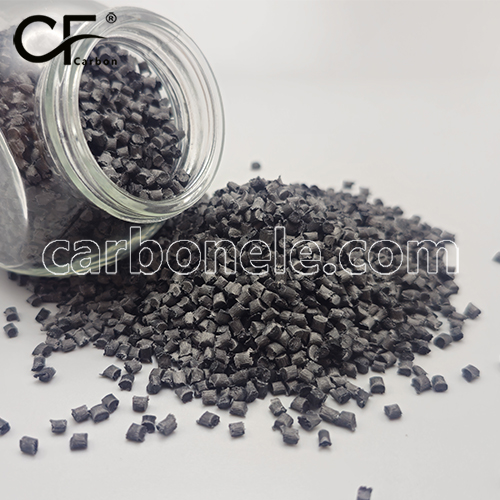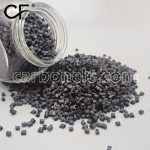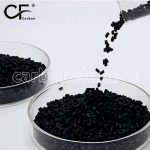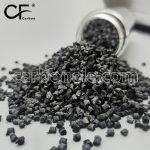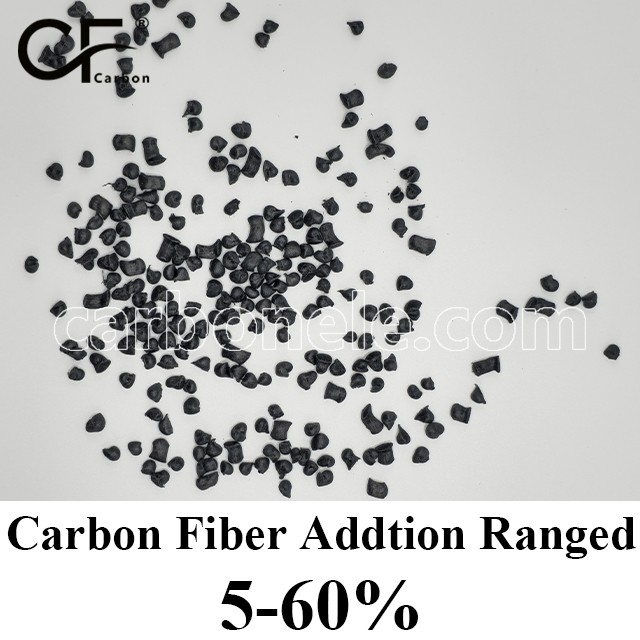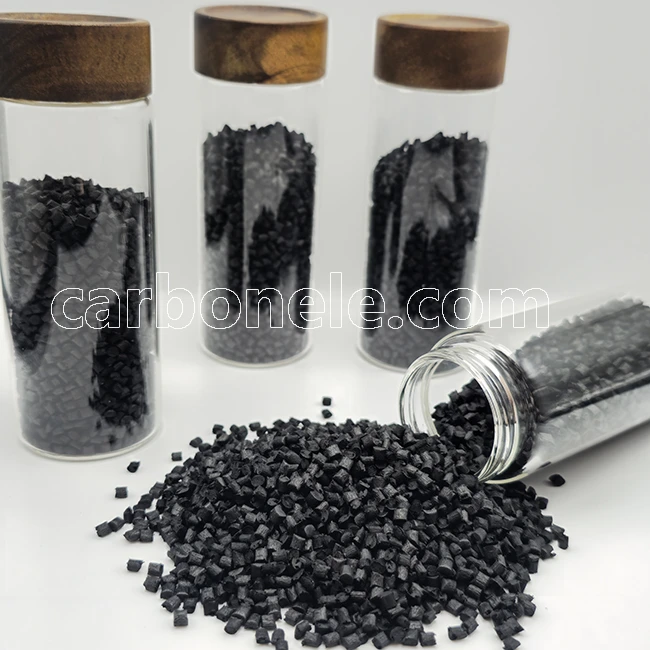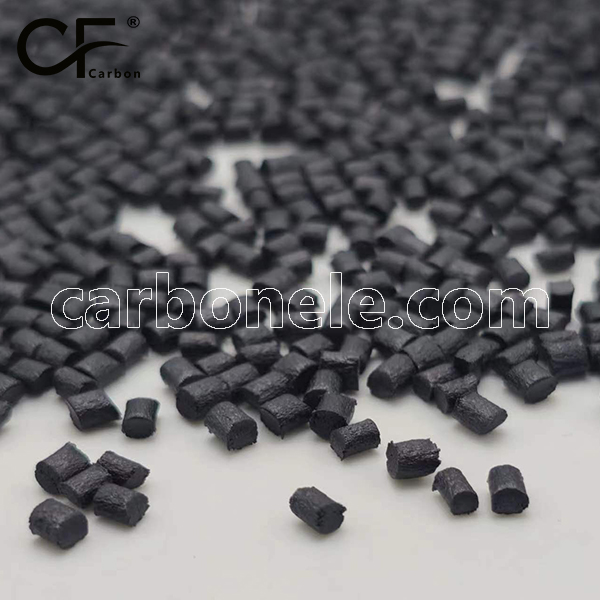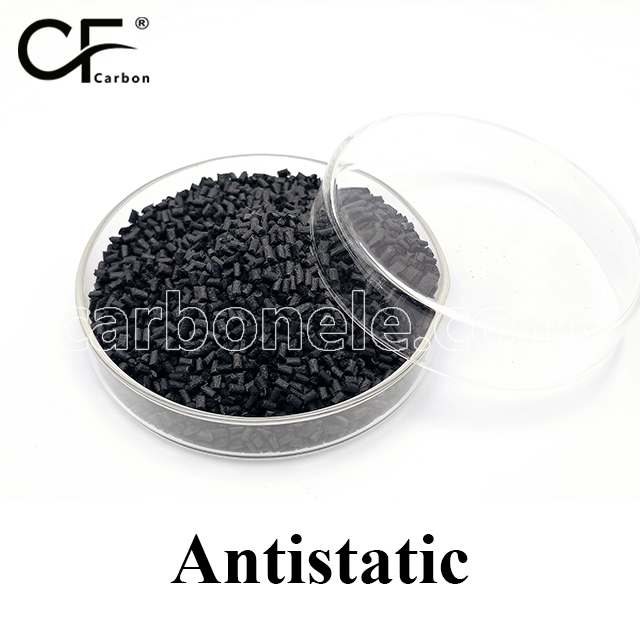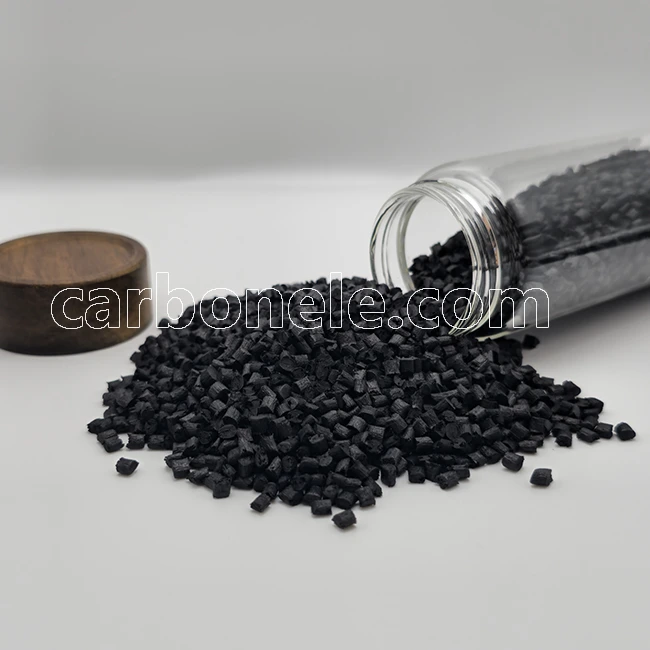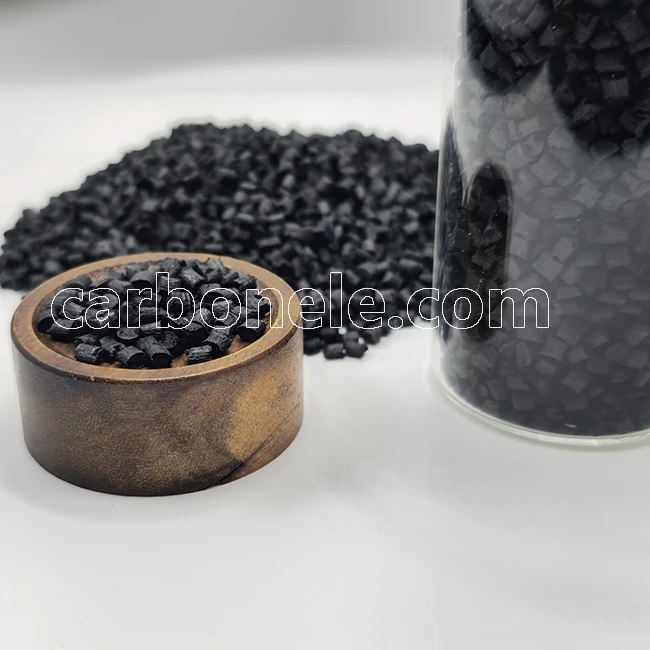
Suitable for Car Crash Bars Material PP-CF30
PP-CF20 is a composite material made of 20% carbon fiber, enhancing the mechanical properties of polypropylene (PP) with improved rigidity. PP is a lightweight, chemically resistant thermoplastic with good processing properties, but its strength and rigidity are poor. PP-CF20 improves the material’s hardness and shape, making it suitable for high-strength and lightweight applications. It also offers chemical resistance and weather resistance, maintaining stable performance in harsh environments. PP-CF20’s thermal stability is enhanced by the addition of carbon fibers, making it suitable for high-temperature environments. Despite its difficulty in processing, PP-CF20 retains good processability, making it suitable for injection molding and extrusion. Its applications include automotive, aerospace, sports equipment, and consumer electronics. PP-CF20’s lightweight and high-strength properties make it suitable for various industries, including automotive, aerospace, sports, and consumer electronics.
- Model number: PP-CF-BCA3
- Matrix Resin: Polypropylene (PP)
- Reinforcing Filler: Carbon fiber
- Appearance: Granules
- Grade: Injection/extrusion grade
- Packaging: 25kgs/bag
PP-CF30 is a composite material that is a carbon fiber reinforced material based on polypropylene (PP) with added carbon fibers. It has excellent physical properties and a wide range of application scenarios.
PP itself is a lightweight and chemically resistant thermoplastic with good processing properties, but it performs poorly in strength and rigidity. By adding CF30, which is 30% carbon fiber, the mechanical properties of PP have been improved, especially in terms of rigidity. And this polypropylene with 30% carbon fiber added is called PP CF30.
PP-CF30 Characteristics
Lightweight and high-strength: PP CF30 adds carbon fiber material while maintaining the low-density characteristics of polypropylene material. At the same time, due to the addition of carbon fiber, the hardness of the material is greatly improved, and the shape is not easily changed. Therefore, this material is particularly suitable for scenarios where both high strength and lightweight are required.
Chemical resistance and weather resistance: Polypropylene (PP) itself has good chemical resistance and corrosion resistance, and can resist the corrosion of the vast majority of chemical reagents. By reinforcing with carbon fiber, it can maintain stable performance even in harsh environments.
Excellent thermal stability: Polypropylene (PP) will not be changerd the shape at high temperatures, but its thermal stability is improved by the addition of carbon fibers. PP CF30 can maintain its physical properties at higher temperatures and is not prone to deformation, making it suitable for work that may require high temperature environments.
Processability: Although carbon fiber reinforced materials are usually difficult to process, the addition of PP CF30 to polypropylene still retains its good processability. So it can be applied to common industrial processing methods such as injection molding and extrusion.
Application Fields of PP-CF30
Automotive industry: Due to its lightweight and high-strength characteristics, PP CF30 is widely used in the manufacturing of automotive components such as bumpers, dashboard brackets, door linings, etc. It can reduce the weight of the entire vehicle, thereby improving fuel efficiency and reducing carbon emissions.
Aerospace: PP CF30 has the characteristics of lightweight and high strength. In the aviation field where weight reduction, fuel efficiency improvement, and high performance are required, PP CF30 is commonly used to manufacture interior components and structural parts.
Sports equipment: PP CF30 is a great choice for sturdy and durable sports such as bicycle frames, skis, and tennis rackets due to its high strength and durability, as it is not easily damaged by external forces.
Consumer Electronics: The durability and lightweight characteristics of PP CF30 make it also applicable in structural components such as electronic device casings, which can make products lighter while maintaining quality.
conclustion
PP CF30 is a composite material made of 30% carbon fiber, enhancing the mechanical properties of polypropylene (PP) with improved rigidity. PP is a lightweight, chemically resistant thermoplastic with good processing properties, but its strength and rigidity are poor.PP CF30 improves the material’s hardness and shape, making it suitable for high-strength and lightweight applications. It also offers chemical resistance and weather resistance, maintaining stable performance in harsh environments.
PP CF30’s thermal stability is enhanced by the addition of carbon fibers, making it suitable for high-temperature environments. Despite its difficulty in processing, PP CF30 retains good processability, making it suitable for injection molding and extrusion. Its applications include automotive, aerospace, sports equipment, and consumer electronics.
PP CF30’s lightweight and high-strength properties make it suitable for various industries, including automotive, aerospace, sports, and consumer electronics.
Overall, PP-CF30 is a high-performance composite material that combines excellent mechanical properties and ease of processing, especially suitable for applications that require lightweight and high strength.
If you want to get more information about PP-CF30, you can vist our Youtube.
Click here to contact us.
PP-CF30 granules
PP-CF30 granules are tiny pellets composed of polypropylene and five percent carbon fiber for reinforcement. The enhanced strength and rigidity offered by carbon fibers are combined with the lightweight and chemical-resistant qualities of polypropylene to create this composite material.



Frequently Asked Questions
Carbon (Xiamen) New Material Co., Ltd. aims to provide buyers with "one-stop" worry-free high-quality services. Here you can find all information about carbon fiber engineering plastics. If you still have questions, please send us an email for consultation!
-
How can I contact the manufacturer of a product that interests me?
When you find a product you are interested in, you can contact the manufacturer directly by sending an email and we will get back to you as soon as possible.
-
How do I find the products that interest me?
All you need to do is enter the keyword, product name in the search window and press the Enter key on your keyboard. Your search results page will then be displayed. You can also search within the product category pages on the home page. Each category is divided into subcategories, allowing you to refine your search and find products that interest you.
-
Where will I find a buying guide?
Please contact our after-sales service directly and we will provide you with a comprehensive operating guide.
-
What are CF Reinforced Thermoplastic Composites?
CF Reinforced Thermoplastic Composites are materials where carbon fibers are incorporated into a thermoplastic matrix. They combine the strength and stiffness of carbon fibers with the processability and recyclability of thermoplastics. For instance, they are used in automotive parts like bumper beams.
-
What are the benefits of CF Reinforced Thermoplastic Composites over traditional composites?
The key benefits include faster production cycles, easier recyclability, and better impact resistance. They also offer design flexibility. An example is in the manufacturing of consumer electronics casings where complex shapes can be achieved more easily.
-
How are CF Reinforced Thermoplastic Composites processed?
Common processing methods include injection molding, extrusion, and compression molding. Injection molding is widely used for mass production. For example, in the production of small components for the medical industry.
-
What industries use CF Reinforced Thermoplastic Composites?
They are utilized in aerospace, automotive, medical, and sports equipment industries. In aerospace, they can be found in interior components. In the medical field, they might be used in prosthetics.
-
How does the carbon fiber content affect the properties of the composites?
Higher carbon fiber content generally leads to increased strength and stiffness but may reduce ductility. A moderate content is often balanced for specific applications. For example, a higher content might be preferred in structural parts of a race car.
-
What are the challenges in using CF Reinforced Thermoplastic Composites?
Challenges include higher material costs, complex processing equipment requirements, and ensuring uniform fiber dispersion. Issues with adhesion between the fibers and the matrix can also arise. An example is in achieving consistent quality in large-scale production.








